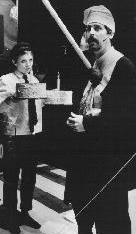SEARCH CurtainUp
REVIEWS
FEATURES
NEWS
Etcetera and
Short Term Listings
LISTINGS
Broadway
Off-Broadway
BOOKS and CDs
OTHER PLACES
Berkshires
London
LA/San Diego
DC
Philadelphia
Elsewhere
QUOTES
On TKTS
LETTERS TO EDITOR
FILM
LINKS
MISCELANEOUS
Free Updates
Masthead
Writing for CurtainUp NYC Weather
Bad Boy Nietzsche
By Les Gutman
Nobody likes to be chained to the wall by somebody
else's imagination.
F. Nietzsche via R. Foreman

|

|
Richard Foreman's take on Nietzsche (Gary Wilmes) focuses, in his typical kaleidoscopic style, on what may be deemed the two pivotal personal experiences of Nietzsche's life: his unfulfilled love for a Russian woman with whom he had an engaging but platonic relationship, here called The Beautiful Woman (Juliana Francis), and his reaction to seeing a horse beaten in the street by a coachman, denominated The Cruel Man (Kevin Hurley). Both of these no doubt fueled the (probably syphilis-induced) insanity that consumed the last decade of his existence.
Foreman's plays always give the feeling of being verbal (as well as visual and sonic) collages. In Bad Boy Nietzsche, he offsets his own often-lyrical language with the random words of a deteriorating Nietzsche ("doodles on the margin of his philosophy"):
Word shards fill the visual landscape and, as cued, chalk scribbles, easily erased, abound.I write on table, write on wall
with foolish heart a foolish scrawl.
You say--the hands of fool deface the table and the wall
erase it all!
I try to help the best I can
I wield a sponge as you recall
but when the cleaning up is done
let's see this super sage emit
upon the walls, sagacious shit!
When I reviewed Foreman's last effort, Paradise Hotel, I made reference to his "signature dream-tableau style, in which primary process thinking finds a rather direct path to the stage.".We find much of this again here, and although Nietzsche's "process" has developed a definite impairment, there's hardly a clearer means of assaying his essence. Do not, however, expect either lucid exposition or fresh observations. Instead, you will find something of an existential nightmare, Foreman-style, in which even the pure voice of The Child (Sarah Louise Lilley) seems to have been processed through the mental equivalent of a funhouse mirror.
Voices here, which would be easily heard without amplification, are rendered through Rent-style head mikes that have much the same distancing effect as Foreman's familiar use of clear plastic sheets to separate the audience from the very proximate stage. It's as if Foreman were begging us to do precisely what we must do to appreciate his work: take a step back and engage the cacophony of images and sounds -- blinking, sometimes blinding lights, buzzing bells and all -- not through a microscope that will focus on elements, but through a telescope that lets us observe the whole. It's only through this means that one could possibly hope to compress not only Nietzsche's life and life's work, but what follows in its wake, into this frantic seventy minutes of theater.
Trying to describe the sensory assault Foreman and his performers hurl at the audience is, ultimately, pointless. Those familiar with his work will find much what they expect; novices, some of whom will become fans and some of whom will not, are assured a rich, funny experience the thoughtful significance of which may not occur to them until it is over. I've never gone to see one of Richard Foreman's annual shows more than once, but I've always felt I would need to. Such is its nature.
The assembled cast of four is excellent and, as always seems to be the case with Foreman's shows, fearless. Wilmes, who returns from a memorable performance in Paradise Hotel last year, embodies Nietzsche's combination of lunacy and anxiety splendidly. Also returning is Francis, who brings a carnivalesque nature and a dazzling faux-Eastern European accent to The Beautiful Woman. Lilley, new to this craziness, has no trouble joining in, nor does Hurley, who enages and alienates by delivering his lines in a voice that often conjures up a cheap television police show.
Chaining Nietzsche to the wall of Foreman's imagination may not stop the spinning, but it should at least reverse its direction.
LINK TO REVIEW MENTIONED ABOVE
CurtainUp's review of Paradise Hotel
| BAD BOY NIETZSCHE
Written, directed and designed by Richard Foreman With Gary Wilmes, Sarah Louise Lilley, Kevin Hurley and Juliana Francis Running time: 1 hour, 10 minutes with no intermission Ontological Theatre Website: http://www.ontological.org Ontological Theatre at St. Mark's Church, 131 East 10th Street (@2nd Av.) (212) 553-4650 Opened February 8, 2000 Closes April 30, 2000 Reviewed by Les Gutman 2/9/2000 based on a 2/6/2000 performance |


